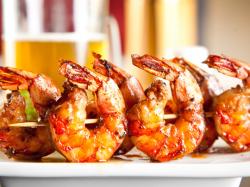SONGA Now Capable Of Offering Four-Star BAP Shrimp
February 28, 2017 | 2 min to read

Congratulations to Ecuador’s SONGA (Sociedad Nacional de Galapagos C.A.), which is now eligible to offer four-star Best Aquaculture Practices (BAP) shrimp, only the second company in Ecuador capable of doing so, the Global Aquaculture Alliance announced in late February.
Four star is the highest designation in the BAP third-party certification program, signifying that a product originates from a BAP-certified feed mill, hatchery, farm and processing plant.
SONGA’s shrimp processing plant, two of its farms (Lebama Farm and Naturisa Farm) and its hatchery (Macrobio Hatchery) recently attained BAP certification. The company sources its feed from GISIS and IMPROSA feed mills in Ecuador, both of which are BAP-certified.
SONGA is one of the top four white shrimp producers in Ecuador. In 2015 and 2016, SONGA was the No. 1 Ecuadorian exporter to mainland China, South Korea and the United States. The company is well known and reliable in the global markets due to its prime quality, consistency and fair weights.
“The efforts of SONGA to differentiate itself by achieving the maximum level of third-party certification truly represent its responsible aquaculture practices. SONGA is one of the leading companies in a leading country committed to environmental and social responsibility. We appreciate very much SONGA´s support,” said Marcos Moya, manager of BAP Supply Development.
BAP is the world’s most comprehensive third-party certification program, with standards encompassing environmental responsibility, social responsibility, food safety, animal health and welfare and traceability.
Currently, there are 29 BAP-certified processing plants, farms, hatcheries and feed mills in Ecuador. Worldwide, there are more than 1,600 BAP-certified facilities.
About BAP
A division of the Global Aquaculture Alliance, Best Aquaculture Practices is an international certification program based on achievable, science-based and continuously improved performance standards for the entire aquaculture supply chain — farms, hatcheries, processing plants and feed mills — that assure healthful foods produced through environmentally and socially responsible means. BAP certification is based on independent audits that evaluate compliance with the BAP standards developed by the Global Aquaculture Alliance.
Source: Global Aquaculture Alliance
